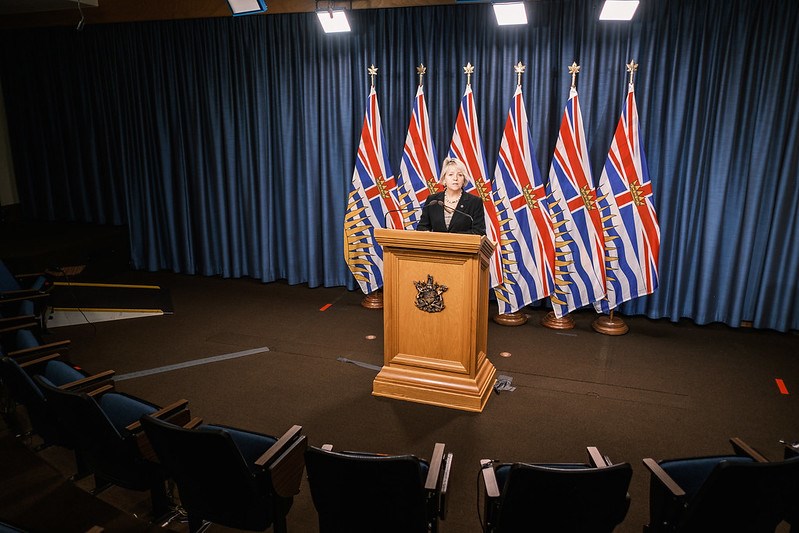B.C.'s provincial health officer Bonnie Henry on January 4 revealed details of the province's planned rollout of vaccines to combat COVID-19 as well as new data to show the spread of the virus in the province.
The number of new daily cases moderated slightly in the latter half of December, and that trend continued, Henry said. Unfortunately, however, 45 more people have died from the virus that spawned a global pandemic, for a total of 946 since the first death in B.C. was recorded on March 9. Most of the new deaths were seniors.
Henry listed a total of 2,211 cases in the past four days, including 565 on January 1, 607 people on January 2, 500 people on January 3 and 539 people on January 4. That brings the total number of people infected to 54,201, since the virus first appeared in B.C. on January 28, 2020. More than 83.4% of those, or 45,229 people, have recovered.
The lower trend in new cases has helped reduce the number of people actively infected with the virus to 6,823 – the smallest number of people with active infections since November 17.
The number of people with severe enough infections to be in hospital has fallen to 351, from 374 on December 31. That includes 76 people who are in intensive care units of those hospitals.
Another 8,785 people are being actively monitored for infections because of known exposure to identified cases. That number does not include anyone from Northern Health, because of data-gathering glitches, Henry said.
Here is a breakdown of where new cases in the past four days were identified:
• 389 people in Vancouver Coastal Health (17.5%);
• 1,301 people in Fraser Health (58.8%);
• 64 in Island Health (2.9%);
• 288 in Interior Health (13%);
• 169 in Northern Health (7.6%); and
• no new cases in people who reside outside the province.
B.C. has so far received 54,625 doses of vaccine, including 34,125 doses of the Pfizer-BioNTech vaccine, and 20,500 doses of the Moderna vaccine. The first doses of the Moderna vaccine arrived on December 28, but were not administered until December 31.
Henry expects to receive an additional 16,575 doses of the Pfizer-BioNTech vaccine by the end of this week, and for an unspecified number of doses of the Moderna vaccine to arrive in the third week of January.
New shipments of the Pfizer-BioNTech vaccine are expected to come weekly, while shipments of the Moderna vaccine are expected to arrive every two to three weeks, Henry said.
She called some of the logistics around distributing the Pfizer-BioNTech vaccine "fussy." That vaccine must be stored at below -70 Celsius, but it also comes with restrictions on how many doses can be moved together at a time, as well as how long the does may be out of the freezer. Advanced training is required for staff for how to handle the vaccine, and special personal protective equipment, such as gloves to handle ultra-low-temperature items, is required.
The AstraZeneca vaccine has been approved in the U.K., and has started to be administered to the public. Henry said Health Canada has received some data related to AstraZeneca clinical trials and that she hopes that the Canadian government will have approved that vaccine sometime in the first quarter of 2021.
Henry said she expects a total of 792,000 doses of vaccine – the Pfizer-BioNTech vaccine and the Moderna vaccine combined – to arrive by the end of March.
"Our plan is to provide at least 549,000, 550,000 people, their first dose, and some of those people will also receive their second dose," Henry said. "That's approximately 542,000 doses of Pfizer and 250,000 doses of the Moderna vaccine."
Henry said that the province has sufficient staff to administer these doses, and that the number of vaccines administered after March will ramp up further.
Henry also outlined a list of priority groups that will be eligible to get a vaccine dose. After the healthcare workers, who have already been getting vaccine doses, will be staff and residents in long-term care homes.
The aim for the end of January will be to get to about 70,000 staff and residents in long-term care, 13,000 people in assisted-living facilities, 2,000 people in hospital waiting to be placed in a long-term care home.
Other priority groups include elders in the community aged older than 80, homeless people, and those in remote and indigenous communities among others.
@GlenKorstrom




